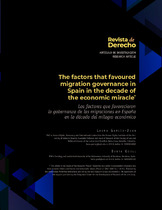The factors that favoured migration governance in Spain in the decade of the economic miracle
Fecha
2019Contribuidor
N/A
Tipo de contenido
article
Citación
Metadatos
Mostrar el registro completo del ítemDocumentos PDF
Resumen
Between 1998 and 2008, Spain lived a phenomenon that had not occurred until then, and that made it the first receiving country in the European Union, even before Germany.
In only ten years, the immigrant population from third countries (non-EU countries) increased exponentially, starting a gradual decline in 2011, coinciding with the deepening of the economic crisis. The massive and sudden arrival of immigrants poses new economic, political and social challenges to the host countries that are difficult to solve if they are not prepared for it. However, in just one decade Spain managed to build solid foundations that favoured the governance of migration and prevented the
rupture of coexistence and social peace. This article analyses the key aspects of the Spanish migratory system that made it possible for several millions of international immigrants to integrate peacefully into Spanish society, some of which were contrary to the guidelines of the European Union.
ISSN
0121-8697
Palabra/s clave
Migration law
Political discourse
Integration policies
EU -- Policy framework
Colecciones
- Artículos [48]
El ítem tiene asociados los siguientes ficheros de licencia:


